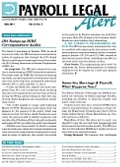Legislation enacted in 2015 requires the U.S. State Department, upon certification from the IRS, to revoke the passports of taxpayers who have seriously delinquent tax debts.
That may be a problem for employers. Employees who can’t take overseas business trips are employees who aren’t productive. Such drastic measures may need an equally drastic response from the Payroll department.
The IRS has now filled in some crucial details regarding this travel restriction.
London calling. Employees will know whether they are seriously delinquent tax debtors: They will owe more than $50,000, including penalties and interest, and the IRS will have issued a tax lien or levy against their property. Liens and levies come at the end of a long collection process, so employees won’t be able to plead ignorance.
Employees will receive Notice CP 508C from the IRS informing them that it has certified the debt to the State Department. Don’t expect email: The IRS will send the notice by regular mail to employees’ last known address.
Employees can have their certifications tossed within 30 days, if the IRS erred in making those certifications; and they can sue in federal district court or the Tax Court, if the IRS refuses to do so.
You never give me your money. Once the IRS certifies seriously delinquent tax debts to the State Department, employees who need their passports for work must pay their balances in full or make alternative payment arrangements, such as entering into installment agreements or offers in compromise. If employees are owed tax refunds, the IRS will apply those funds to reduce their tax debt.
Employees can settle their cases with the Justice Department or request collection due-process hearings from the IRS to dispute the levies. The IRS has 30 days to reverse a certification after employees’ tax problems are resolved. Employees can also sue if the IRS fails to reverse a certification.
Take the money and run. In some cases, however, an employer’s only immediate option may be to pick up the tab on employees’ back taxes, since negotiating installment agreements or offers in compromise with the IRS is time consuming.
If you pay for the services of an accountant or a lawyer, or pick up the tab for employees’ back taxes, those payments are fully taxable to employees. You may treat the payments as supplemental pay. As an alternative, you could extend loans to employees. All loan agreements should be in writing, charge market-rate interest and be legally enforceable.
VIENNA WAITS FOR YOU: Provided you’ve withheld taxes in accordance with employees’ W-4s, you’re not liable to them for their seriously delinquent tax debts, despite what they say or threaten. You might suggest to them that they can get a handle on their current taxes by reviewing their withholding.
[icegram unknown-campaigns=”48241″ known-campaigns=”48241″]
